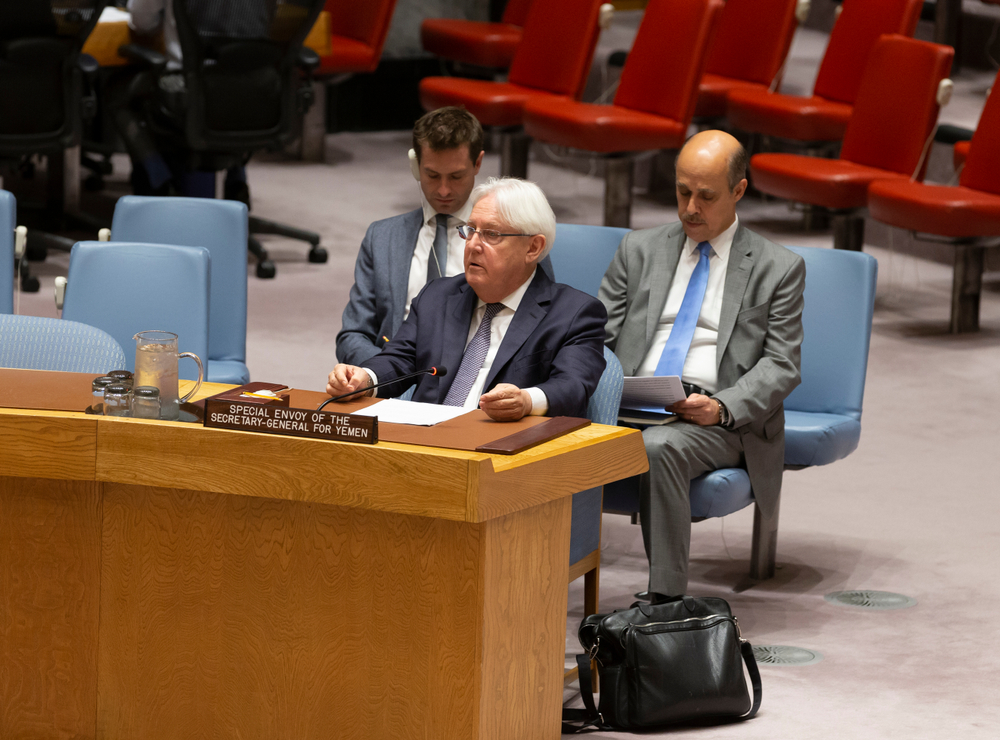
Martin Griffiths (lev radin via Shutterstock)
https://lobelog.com/does-yemen-need-a-new-un-envoy/
by Khalid Al-Karimi
Yemen’s internationally-recognized government has openly expressed dissatisfaction with the performance of United Nations Special Envoy to Yemen Martin Griffiths. It has been furious and unsatisfied with the performance of this UN official. This is the first time the Yemeni government has expressed such hostility toward Griffiths, and it raises concerns about his ability to bring about a resolution to Yemen’s ongoing civil war.
On May 22, Yemeni President Abd Rabbuh Mansur Hadi sent a five-page letter to UN Secretary-General Antonio Guterres, revealing his discontentedness with what the letter described as the UN envoy’s “weak understanding of the nature of Yemen’s ongoing conflict.” Hadi added that he “can no longer tolerate the violations committed by the special envoy, which threaten prospects for a solution.”
Hadi’s Grievances
Hadi’s complaints about Griffiths revolve around two issues. First has to do with the Houthis’ unilateral pullout from three ports in Hodeidah province. Griffiths approved the pullout and later reported to the UN that “the military forces of Ansar Allah [the Houthi movement’s formal name] have now left the three ports…This progress will allow the United Nations to play the “leading role” given to it in supporting the Yemen Red Sea Ports Corporation in management and inspections at the ports.”
However, Griffiths’ approval of the Houthi withdrawal came despite the Yemeni government’s absolute rejection of the move. In fact, a Yemeni government official described the pullout as a “theatrical play” wherein the Houthis handed control of the ports to their “own forces” under a different name and uniform.
Second, Griffiths has been referring to the Houthis as a “de-facto government”. In Hadi’s view, Griffiths is dealing with questions of legitimacy and treating the Houthis—who seized power in 2014 by military force—as if they are on equal terms with his government.
Over the last few days, pro-government voices have been loudly slamming Griffiths’ performance, and Hadi’s letter is not the only indicator of discord between the Yemeni government and the UN envoy. Last week, for example, the Yemeni parliament urged the government to halt negotiations with the UN until it revisits the “supposed” Houthi pullout from Hodeidah’s ports. The parliament vented its anger in a statement, saying “The approach that the UN envoy has taken will not achieve peace but will prolong the war and the suffering of the Yemeni people.”
Threats to Peace
One side in Yemen’s civil war is unhappy with Griffiths’ performance, but the other feels the opposite. Indeed, the Houthis so far seem pleased with his role. Houthi leader Mohamed Ali Al-Houthi said in a tweet on Friday that Hadi’s letter to the UN chief was “a miserable attempt to curtail peace.” But while Griffiths has put in extensive effort and made countless diplomatic tours in a bid to break the deadlock in Yemen, the breakdown in his relationship with the Yemeni government will make it much harder for him to achieve a peaceful settlement.
When Griffiths was appointed in February of last year to replace his predecessor, hopes soared that he would be able to make inroads into Yemen’s deadly political stalemate. Many thought his experience and country of origin would positively influence the progress of UN-led peace efforts. Griffiths has been viewed as a seasoned conflict resolution expert and he hails from the United Kingdom, which not only plays a leading role in the conflict in Yemen but is also a permanent member of the UN Security Council.
In December of last year, Houthi and government representatives assembled in Sweden thanks to Griffiths’ efforts in bringing the two sides together. They shook hands and signed a peace plan under the auspices of the UN. The plan addressed in principle several thorny questions, including the removal of troops from Hodeidah’s ports, lifting the siege around the city of Taiz, and swapping prisoners of war. Five months have elapsed since that deal was concluded, and so far the warring sides have made little progress in actually implementing it. And now that the Yemeni government has accused Griffiths of siding with the Houthis, hopes for further peace talks have dissipated.
Finding the Right Envoy
Indisputably, Yemen’s conflict is a very complicated one, and no one person can manage to terminate the strife and bury the disputes in the country without unwavering international support. It is true that the continuity of war is attributed to its complexity, but it is also emblematic of the UN’s powerlessness or lack of serious will to see the conflict in Yemen resolved.
Since the breakout of the war in Yemen in 2015, three UN envoys have been appointed to bring the conflict to a peaceful resolution. The first envoy was Jamal Benomar, who left his position in April 2015 at a time when fighting was spreading like wildfire. Ismael Ould Sheikh replaced him, but he stepped down in January of 2018, having made no progress towards peace. It remains to be seen if Griffiths will follow suit and bid farewell to Yemen and its conflict.
Hadi’s letter may pave the way for Griffiths’ departure and the arrival of a new UN envoy to Yemen. The vicious circle of Yemen’s war will continue and the UN envoys will likely keep coming and going barring a major shift in the course of the war. In the meantime, Yemeni civilians and fighters alike may stop believing that UN envoys can play a key role in ending their destructive war.
Khalid Al-Karimi is a freelance reporter and translator. He is a staff member of the Sana’a-based Yemeni Media Center and previously worked as a full-time editor and reporter at the Yemen Times newspaper.
https://lobelog.com/does-yemen-need-a-new-un-envoy/






0 Comments